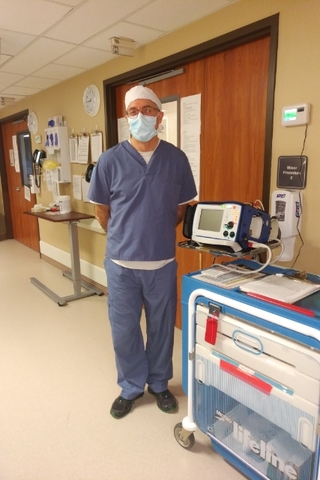Imagine being tasked with training hospital staff to stay safe while treating COVID-19 patients. Now, ponder doing this when knowledge of the virus is continually changing. Add anxiety for health care workers and patients, and you’ve got Dr. Steve Ferracutti’s job for the past couple of months.
While teaching and training staff isn’t new to him, it’s been intermittent, so the “intensity and frequency has certainly ramped up in response to the coronavirus pandemic, to be as prepared as we possibly could for something like this,” Dr. Ferracutti said in an interview.
He said knowledge about the disease has changed dramatically “and we still have a vast gap in our understanding of how the disease works and how we should be managing it.” For example, it is unclear whether people are developing immunity.
Understanding is improving, though, as Haliburton County and Canada learn from other jurisdictions, whether it’s Italy or New York. The general practitioner said when he started training staff there was “a pretty high level of anxiety at the get-go because almost everything about this was an unknown. There were concerns about their personal safety, and their families, their patients, and the community.”
However, health care practitioners had some advantages to, say, a store clerk, with more accessibility to information about personal protective equipment and what was appropriate at any given time.
“Once a plan starts to roll out, and be communicated to people, then even though they know there is still some risk, they know how to prepare for it. It helps reduce the level of anxiety,” Dr. Ferracutti said.
He added thankfully so far, “almost everywhere in Canada, including Haliburton County, has so far avoided the big wave of cases” and continue to learn from other people’s experiences.
He is personally still anxious as he feels “it is really difficult to know what is to come. When you look around the world, it’s really difficult to understand why one area has been hit hard, and another area not hit hard. Is it because preparations were better? A lot just seems like plain dumb luck.”
He is also conscious of humans balancing having to live and reducing the burden of disease, calling it a “mortality-freedom trade-off.”
He said he’s hearing messaging that Ontario is past the peak, and restrictions are loosening up, which might be true but “I don’t know that it’s true. There is almost no immunity in the community because very few people have had this thing.”
He said the bottom line for health professionals is to remain prepared “for the worst, hope for the best.”
As a GP, he said he is also worried that some people who should have come to hospital, but stayed away for fear of COVID-19, have done themselves a disservice, including people suffering from heart attacks and strokes. He encouraged people to seek out acute care.
“They don’t need to be terrified. Procedures do make it pretty safe for people to attend if they have a serious problem that needs attending.”
On a personal note, he said it had definitely been the most unusual time in his work life.
“The world has never seen anything like this. I’ve done some work here, and other places, regarding health systems and emergency systems, but this is so different. We’ve turned hospitals upside down and inside out to prepare for this.”
Dr. Ferracutti added it’s been complicated technically and emotionally but the local response “has really been great to see. People are coming together as a team and are prepared to learn and putting us in a much better position for treatment and care of critical patients when this is all done. So, that part is exciting.”




